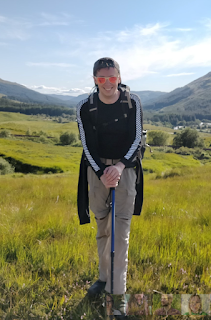This blog post is by Zsuzsanna Chappell. Zsuzsanna is an independent scholar and research associate at the Centre for the Philosophy of Natural and Social Sciences, London School of Economics. She currently writes on the social philosophy and ethics of mental illness, and the role of researchers with subject-relevant lived experience in the human sciences. Previously, she held academic positions at the London School of Economics and the University of Manchester and is the author of Deliberative Democracy: A Critical Introduction, Palgrave 2012.
Zsuzsanna reports from the third annual Philosophy of Psychiatry and Lived Experience workshop. The workshop was held on 17-18 April 2023, online (hosted by the University of Umeå). The aim of these workshops has been to bring together philosophers and philosophy-adjacent scholars who self-identify as having lived experience of mental disability / difference, and are also writing on these topics.
 |
| University of Umeå |
Zsuzsanna Chappell (me!), Sofia Jeppsson and Paul Lodge started organising these workshops during the pandemic. We have since been joined by August Gorman and Elliot Porter. All of us are Mad philosophers and we all felt that there was a need for a safe place where philosophers with experiences which are often difficult to talk about and stigmatised could talk freely and provide feedback on each others’ work. The workshop is open to anyone with lived experience, regardless of the concept and identity they prefer to use: madness, neurodiversity, mental illness, and so on.
Why the need for a workshop just for scholars with subject-relevant lived experience? Sofia Jeppsson writes that talking to each other as Mad / neurodivergent scholars helps us to see how diverse our experiences are. Paul Lodge views it as a form of consciousness raising among Mad scholars, and argues that a philosophy of psychiatry, where there are relatively few contributions by Mad philosophers, is as if feminist philosophy was dominated by the voices of men.
I (ZC) argue that it is important to have a space reserved for those of us with lived experience, as it allows us to present ideas with an audience like ourselves in mind, rather than primarily addressing the “Sane” majority and their needs. I hope that these workshops will create space for views and voices which would not otherwise be heard, and encourage more people to do this sort of philosophical work.
 |
| Zsuzsanna Chappell |
August Gorman argues that by truly grappling with the lived realities of philosophers whose experiences are at times quite different from the presumed ‘Ideal/Typical/"Normal" Person’ who plays an implicit role in shaping so many of our theories, we have to upend a lot of what is assumed. They find it useful to have a community of fellow travelers to build new things back up again with.
Elliott Porter writes that Mad people have very particular interpretive needs, and a community of mad enquirers is therefore what we need to refine our interpretive tools. This doesn’t just allow us to navigate madness more effectively, but it also allows us to condense the particular knowledge that Mad points of view have privileged access to.
So far, we have limited participation in our workshops to academic philosophers and philosophy-adjacent scholars who self-identify as having lived experience of mental disability / difference. (We never ask for any details or disclosure beyond a basic self-identification.) Presenters are free to give talks which are as personal or as abstract and general a they wish. Our group is not a “secret” one, but we have struggled with working out how to advertise it effectively beyond word of mouth.
We have also talked about a workshop where we would share our work with “Sane” allies, about the possibility of starting a blog, and are planning a workshop based in an American time zone. This blog post is part of our efforts to publicise our work more widely. If you are a philosopher of psychiatry / mental health / neurodiversity with lived experience or if you are an ally who would like to support our project, we would love to hear from you at PhilPsyLivedExp@gmail.com
Six papers were presented this year. Two are described in this post while the remainder will be described in a post to appear next week.
Sam Fellowes (Lancaster University): How the lived experience of experts-by-experience relates to the abstract nature of science
Fellowes made a really interesting argument about how an abstract concept such as “autism” will influence the study of that same concept even if we draw of the involvement of “experts-by-experience”, that is people who have a lived experience of autism. He argued that such disorder definitions require abstract science and cannot be derived from lived experience. Of course, this led to a good debate during discussions about the extent to which those with subject-relevant lived experience can be epistemic authorities on the nature of that experience.
Fellowes made the point that since definitions and concepts are not only abstract, but also highly abstracted from reality, they will only represent individual experiences very imperfectly. This means that experts-by-experience may be best placed to help make value judgments during the process of scientific research, while they may need to accept the existing techniques for abstraction as given. Lived experience itself will need to be interpreted through scientific notions. I really enjoyed listening to a talk on what was in essence philosophy of science rather than philosophy of psychiatry, as this showed how wide the scope of our shared topics of interest are.
 |
| Eliott Porter |
Elliott Porter (University of Birmingham): Madness, Silencing, and Colloquial Terms
Porter raised the question of how Mad people can understand themselves when so much of our colloquial language uses words such as “crazy” rather liberally. I found it especially interesting how our views diverged during Q&A. Someone else found the term “crazy” objectionable, I myself draw the line at “psycho” being used as a common term to describe e.g. ex-lovers or politicians. Porter argues that using this kind of language is subordinating and silencing. Once something or someone is ruled “insane”, we are invited not to pay attention anymore. Yet, we all continue to use such language, even if we are aware of its potentially troubling aspects.
He argued that it is better to think of these thoughts as illegitimate, rather than symptomatic. Illegitimacy is a local failing, whereas symptomatic thought speaks to a wider deficiency. Drawing on the self-trust literature and McGrath’s (2019) account of undercutters to moral knowledge, he argues that madness-language with connotations of illegitimacy is a valuable hermeneutic resource for Mad people particularly because it allows us to interpret illegitimate thoughts in ways that do not undercut self-trust.